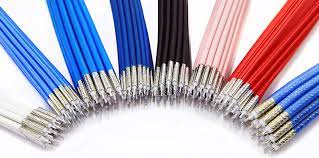Selecting the appropriate cable material for your electrical needs is a critical aspect of any wiring project. The cable material you choose can significantly impact the safety, efficiency, and performance of your electrical system. In this guide, we will explore the key factors to consider when selecting Cable Material, different types of cables, and their applications.
Understanding the Basics
Before delving into cable materials, it's essential to understand some fundamental concepts:
-
Conductivity: The ability of a material to carry an electrical current is called conductivity. High conductivity materials like copper and aluminum are commonly used in electrical cables.
-
Insulation: Insulation materials are used to cover conductors to prevent electrical leakage and ensure safety. Common insulation materials include PVC (polyvinyl chloride), XLPE (cross-linked polyethylene), and rubber.
-
Voltage Rating: Cables are rated for specific voltage levels. Ensure your cable material and insulation are suitable for the voltage of your electrical system.
Factors to Consider When Choosing Cable Materials
-
Conductor Material: Copper or Aluminum?
- Copper: Copper is an excellent conductor of electricity and is widely used in residential and commercial applications. It is more expensive than aluminum but offers superior conductivity and corrosion resistance.
- Aluminum: Aluminum is a cost-effective alternative to copper, often used in larger installations. It's lightweight but less conductive. Proper connectors and insulation are crucial when using aluminum cables.
-
Insulation Material:
- PVC: PVC insulation is commonly used in low-voltage applications. It's affordable and provides good protection against moisture and abrasion.
- XLPE: Cross-linked polyethylene insulation is suitable for medium to high-voltage applications. It offers better thermal and chemical resistance than PVC.
- Rubber: Rubber insulation is flexible and resilient, making it ideal for portable and outdoor applications.
-
Temperature Rating:
- Ensure that the cable's temperature rating matches the environmental conditions it will face. Cables used in extreme heat or cold should have appropriate insulation to maintain performance and safety.
-
Environmental Factors:
- Consider factors like exposure to moisture, chemicals, sunlight, and physical abrasion. Choose cable materials and insulation that are designed to withstand these conditions.
Types of Cables and Their Applications
-
Power Cables:
- THHN/THWN: These are widely used for residential and commercial wiring. They have PVC insulation and are suitable for dry or wet locations.
- XHHW: Designed for use in conduit or raceways, these cables have XLPE insulation and are resistant to moisture and heat.
-
Control Cables:
- TC (Tray Cable): TC cables are versatile and suitable for a range of applications, including industrial machinery and control systems.
- PLTC (Power-Limited Tray Cable): PLTC cables are designed for use in Class 2 and Class 3 circuits, often found in data and communication systems.
-
Instrumentation Cables:
- Type J, K, T, E Thermocouple Cables: These specialized cables are used for temperature measurement and control systems.
-
Fiber Optic Cables:
- Fiber optic cables use glass or plastic fibers to transmit data as light pulses. They are ideal for high-speed data transmission and long-distance communication.
Conclusion
Choosing the right cable material for your electrical needs is crucial for the safety and efficiency of your electrical system. Consider factors like conductor material, insulation type, temperature rating, and environmental conditions. Additionally, always adhere to local electrical codes and regulations to ensure your wiring is safe and compliant. When in doubt, consult with a qualified electrician or engineer for guidance on selecting the most appropriate cable material for your specific application.


No comments yet